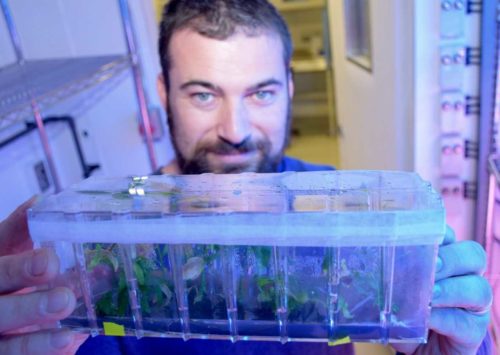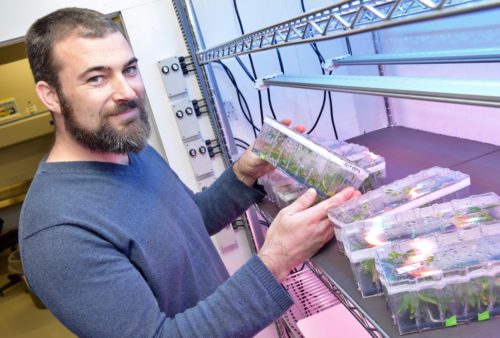
A University of Guelph plant scientist has been given the green light by Health Canada to grow cannabis on campus.
Under the licence granted to cultivate cannabis in his lab, Prof. Max Jones plans to study everything from cannabis genes to optimal growing conditions to help bring scientific rigour to Canada’s newly legal industry.
This project grabbed national headlines with stories on CTV, Global News and CBC.
Jones obtained a research licence last month to grow cannabis in vitro. He will develop propagation methods and tools, and work to optimize greenhouse growing conditions needed to nurture a potential multibillion-dollar market in Canada following the recent legalization of recreational cannabis.
He also aims to help train students for careers in the growing industry.
“We have a chance to develop new technologies and train employees to bring the cannabis industry into the 21st century,” said Jones, whose work will ultimately tie into a wider cannabis research centre planned for U of G.
The tissue culture specialist received cannabis seeds and plantlets from Tweed Inc.in Smiths Falls, Ont.
Before now, U of G cannabis studies have taken place only on licensed partner company premises rather than on campus.
Jones will grow the material in a secure culture room on campus, where he maintains a suite of tissue culture labs that will allow him to work out optimum propagation and cultivation methods for the industry.
Those techniques are currently lacking or rudimentary, said Jones.
“Very little research has been done. We’re playing catch-up really,” he said. “This technology is commonplace for established economically important crops.”

By studying plant biotechnology, he aims to help cannabis breeders and growers develop reliable breeding lines and find ways to bulk up plants.
By nurturing plants and plant material in growth media, tissue culture enables him to grow cells, tissue, organs and whole plants in a sterile, controlled way.
Referring to stringent Health Canada requirements on everything from pests and disease to heavy metals, he said, “The industry needs a continual supply of healthy, clean, reliable plants. Tissue culture allows you to transfer plants reliably between facilities and countries. You want to ensure you’re not transporting pests and disease.”
Jones will also study optimum conditions to help growers nurture cannabis plants in industry greenhouses and growth chambers.
He’s worked with Canopy for two years to develop in vitro technologies.
This is just one of several partnerships U of G researchers have with companies in the cannabis industry.
Along with Prof. Youbin Zheng, School of Environmental Sciences (SES), Jones recently received a provincial research grant to study greenhouse lighting and fertilization with Up Cannabis. Up Cannabis is an Oakville-based licensed producer with one growing facility in Brantford and one in the Niagara region.
Also, Zheng and SES professor Mike Dixon have worked with VIVO Cannabis Inc. (formerly ABcann Medicinals) based in Napanee, Ont. There, they study effects of environmental conditions on production of hundreds of medicinal compounds in cannabis, including cannabinoids, terpenes and flavonoids.

The researchers aim to continue those studies on campus in the proposed Guelph Centre for Cannabis Research. Dixon said the centre will require a full-scale research and development licence.
“For medical cannabis, the big limitation is consistency of products,” said Dixon. “Breeding and genetics is part of it. Once we establish how breeding and genetics and the environment control ‘recipe’ yields a particular profile of a medical compound, then we’ll be on the way to raising cannabis to the status of a conventional pharmaceutical commodity.”
Jones said cannabis poses intriguing scientific challenges.
“There’s a lot of interesting research, a lot of unknowns. The University is a good setting to do that. Canada has an opportunity to remain a leader in this industry, but it will require investments in research and students trained in the field.”